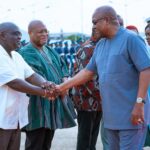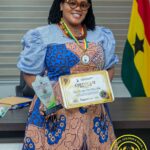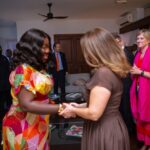ActionAid Ghana (AAG), a Non-Governmental Organization (NGO), says the future of Africa depends on stakeholders’ ability to empower girls to lead inclusively, courageously, and effectively.
It noted that “Girls do not lack the potential to lead, rather lack the space to do so, space must not be given as charity; it must be claimed as a right and supported through intentional systems change.”
The NGO, through its Programme Officer in the Upper East Region, Mr Yakubu Akuka, said this at the fifth regional conference of the Young Female Platforms (YFP) held at Kusanaba Senior High School in the Bawku West District.
The conference, themed: “Bold voices, equal spaces: Empowering girls for transformative leadership,” gathered members of the platforms from Senior High Schools, Persons with Disabilities (PWDs) from two communities and stakeholders.
The AAG started the YFP model in 2009 to address the broad challenge of low participation of women and girls in leadership and decision-making.
The initiative was introduced in the Upper East Region in 2019 and currently operated in nine schools and two selected communities in the Region with PWDs.
Mr Akuka said the fundamental element of empowerment was encouraging girls to own their voices and make their own choice, “Every girl deserves the right to express herself freely, be heard, and shape her own future.
“This means supporting girls to speak out against injustice, participate actively in their communities, and refuse to accept limiting narratives,” he added.
Mr Akuka observed that across many societies in Ghana and other African countries, especially those faced with social and economic challenges, women and young girls continued to encounter numerous barriers that limited their potential.
“These obstacles, such as gender-based violence and biases, child marriage, limited access to education, and economic hardship, are not merely unfortunate circumstances; they are systemic injustices that demand urgent attention and action,” he added.
The Programme Officer called on stakeholders to envision a world where girls just not waited to be invited to lead, but were already leading in classrooms, as school prefects, and on regional platforms.
He told the stakeholders that “Let today not be another conference where we agree in principle but delay in practice. Let it be the turning point where each of us commit to funding, mentoring, and fighting for a generation of bold, brilliant, and inclusive girl leaders who will shape the future of Ghana and Africa.”
Mr Akuka said if girls were educated and empowered, the ripple effect transformed entire communities, “The World Bank estimates that closing gender gaps in earnings and productivity could increase African countries’ GDP by as much as 10 percent.”
He indicated that investing in girls’ leadership was not only a matter of equity, but smart economics and social necessity for development.
Madam Alice Ellen Abeere-Inga, the Upper East Regional Director of the Ghana Education Service (GES), delivered the keynote address on “Breaking barriers: empowering today’s girls to become tomorrow’s transformational leaders.”
According to her, education was the single most powerful equalizer, and that a girl with access to quality education was not just a student, but a future legislator, educator, entrepreneur and change agent.
“Let us make schools safe, curricula relevant, and opportunities accessible by providing them with the needed tools, resources, and support, which ActionAid is doing perfectly. We entreat other stakeholders to emulate the same to aid the growth of these young girls,” Madam Abeere-Inga said.
GNA


















